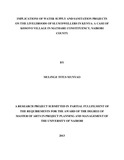| dc.contributor.author | Mulinge, Titus M | |
| dc.date.accessioned | 2013-07-30T12:47:09Z | |
| dc.date.available | 2013-07-30T12:47:09Z | |
| dc.date.issued | 2013 | |
| dc.identifier.citation | Munyao, M. T.;2013.Implications Of Water Supply And Sanitation Projects On The Livelihoods Of Slum Dwellers In Kenya: A Case Of Kosovo Village In Mathare Constituency, Nairobi County. | en |
| dc.identifier.uri | http://erepository.uonbi.ac.ke:8080/xmlui/handle/123456789/52600 | |
| dc.description.abstract | Providing adequate safe water and good sanitation can enhance people's livelihood options by
making significant additions to good health, clean environmental conditions and generate
income. However, there exists no comprehensive study that has ever focused on documenting the
implications of water and sanitation projects on the livelihoods of slum dwellers in developing
countries like Kenya. The study therefore, aimed to establish the implications of water and
sanitation projects on the livelihoods of slum dwellers in Kenya where the focus was on Kosovo
village residents in Mathare slums. The objectives of this study was to establish the influence of
water pricing on the economic status of Kosovo slum dwellers, to determine the effect of safe
water provision on the health of Kosovo slum dwellers, and to examine the influence of adequate
sanitation provision on Kosovo slum environmental conditions. The research design adopted for
this study was the descriptive research design. The targeted population for this study included all
persons over the age of 18 in Kosovo village. The study selected a sample of 515 respondents
using simple random sampling. Primary data collected in this project comprised of both
qualitative and quantitative data. Questionnaires were self-administered with help of research
assistants. Quantitative data collected was analyzed by the use of descriptive statistics using
SPSS while qualitative data was analyzed using content analysis. The results were presented
through percentages, means, and frequencies. The information was displayed by use of tables
and in prose-form. The research found out that water and sanitation projects in slums had
contributed positively towards improved livelihoods of the residents at the local level through
safe water access, reduced water pricing and improved sanitation provision. The research project
recommended that water and sanitation projects should be up-scaled in slums since they were felt
to have significant implications on the livelihood of the residents. The study also recommended
that other infrastructural facilities that complement provision of water and sanitation projects
such as proper route networks and drainage channels should be constructed alongside such
projects. The study also recommended all the personnel involved in the implementation of water
and sanitation projects should be constantly trained on proper project management practices and
community participation ensured to ensure sustainability of water and sanitation projects thus
enhancing continued livelihood improvement. | en |
| dc.language.iso | en | en |
| dc.publisher | University of Nairobi | en |
| dc.title | Implications of Water Supply and Sanitation Projects on the Livelihoods of Slum Dwellers in Kenya: a Case of Kosovo Village in Mathare Constituency, Nairobi County | en |
| dc.type | Thesis | en |
| local.publisher | College of Humanities and Social Sciences | en |

